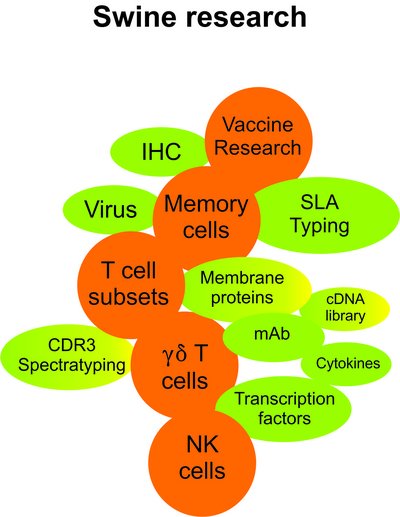- Immunology /
- Research /
- Research topics
Research topics
Historical, our research focuses on the characterisation of the porcine immune system, with special reference to the innate and the adaptive immune response.
With regard to the innate immune system, we are interested in the phenotypic and functional characterisation of natural killer cells, their regulation and interplay with various other cell subsets.
Additionally, the gamma/delta T cells are considered playing a bridging role between the innate and the adaptive immune system. The gamma/delta T cells are characterised by their T-cell receptor consisting of a gamma and a delta chain. Interestingly, they can be found at high frequencies in the pig, suggesting important functions which still have to be investigated for this species in more detail.
Among the cells of the adaptive immune system, we are focused on the differentiation of T-cell subsets such as T-helper cells, cytolytic T cells together with regulatory T cells, regarding their regulation and interplay with other cell subsets.
As for the activation of the adaptive immune system, antigenic peptides have to be presented to T lymphocytes via the major histocombatibility complex (MHC), the characterisation of this highly polymorphic swine leukocyte antigen (SLA) gene cluster has been recently added to our research topics.
Further interests lay in the underlaying mechanisms of immunological memory and the formation of memory cells to strengthen the knowledge on this distinct immune cell population with regard to host-pathogen interactions.
To better understand immunological networks will contribute to applied research by putting forward vaccine design in close collaboration with the identification of pathogen structures, being recognised by both, the cellular and humoral immune system.
